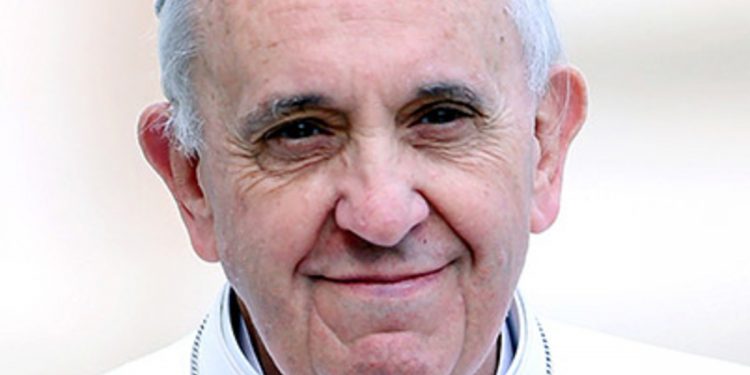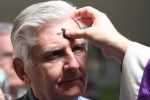Defending Pope Francis – Pt. 2 – Amoris Laetitia

In my last post, I outlined the controversy over Pope Francis’s apostolic exhortation Amoris Laetitia. Now let’s break down what I have found to be the three key and most common objections to AL. The first two are closely related, so we’ll consider them together:
The Objections
- Pope Francis is claimed to give tacit approval to adultery when he posits “exceptional” cases where a Catholic is divorced from a presumably valid nuptial union, remarried outside of the Church, and yet able to receive communion licitly in the Church.
- Pope Francis is claimed to contradict divine law as laid out plainly by our Lord himself in the Gospels: “Everyone who divorces his wife and marries another commits adultery, and he who marries a woman divorced from her husband commits adultery” (Luke 16:18; see Mark 10:11-12, Matt. 19:9, I Cor. 7:10-11).
A Catholic Response
The pope made quite clear that he is not giving any sort of approval to adultery. In paragraph 297, he says:
[I]f someone flaunts [flouts] an objective sin as if it were part of the Christian ideal, or wants to impose something other than what the Church teaches, he or she can in no way presume to teach or preach to others; this is a case of something which separates from the community (cf. Matt. 18:17). Such a person needs to listen once more to the gospel message and its call to conversion.
Our Holy Father uses the language of excommunication here! I don’t know if he could have been any more forceful of the fact that he is not changing doctrine other than to say anyone who were to attempt to do so would be guilty of something that could merit excommunication.
As I said in my previous post, Pope Francis is merely applying what is already dogmatic teaching to the situation of the divorced and remarried outside of the Church.
- Those living in such situations are in an objectively sinful state involving grave matter.
- Those living in such situations are only guilt of mortal sin if they meet the necessary conditions for grave matter to become mortal in the life of the Christian. First, the act performed must involve grave matter. Second, the person acting must have full knowledge that what he is doing is indeed grave matter. And third, he must freely and deliberately engage his will in committing the sin which involves grave matter.
- There are numerous mitigating factors possible that can result in persons being venially culpable for what is objectively grave matter.
In fact, in paragraph 295, Pope Francis agrees with Pope St. John Paul II, from Familiaris Consortio (FC), that there can never be a change in the divine law of God. The moral law is given to us as a gift from God. He reminds us that it was St. John Paul II who:
. . . proposed the so-called “law of gradualness” in the knowledge that the human being “knows, loves and accomplishes moral good by different stages of growth” (FC 34). This is not a “gradualness of law” but rather a gradualness in the prudential exercise of free acts on the part of subjects who are not in a position to understand, appreciate, or fully carry out the objective demands of the law. The law is itself a gift of God that points out the way, a gift for everyone without exception; it can be followed with the help of grace, even though each human being “advances gradually with the progressive integration of the gifts of God and the demands of God’s definitive and absolute love in his or her entire personal and social life” (AL, 9).
Pope Francis also made clear “in order to avoid all misunderstanding” that he is in opposition to any who would water down the gospel. He says the essential truth of the gospel must be proclaimed in its entirety, including the indissolubility of marriage:
In order to avoid all misunderstanding, I would point out that in no way must the Church desist from proposing the full ideal of marriage, God’s plan in all its grandeur: “Young people who are baptized should be encouraged to understand that the sacrament of marriage can enrich their prospects of love and that they can be sustained by the grace of Christ in the sacrament and by the possibility of participating fully in the life of the Church.” A lukewarm attitude, any kind of relativism, or an undue reticence in proposing that ideal would be a lack of fidelity to the Gospel and also of love on the part of the Church for young people themselves. To show understanding in the face of exceptional situations never implies dimming the light of the fuller ideal or proposing less than what Jesus offers to the human being. Today, more important than the pastoral care of failures is the pastoral effort to strengthen marriages and thus to prevent their breakdown (AL307).
Pope Francis is not talking about changing, or even making “exceptions” to, the sixth commandment or the Sermon on the Mount; he is talking about whether or not individuals can break a commandment while not being fully culpable for it. And the answer is: yes they can.
In a nutshell, Pope Francis is no more giving “tacit approval” to adultery by acknowledging the fact that a person can possibly commit adultery without being mortally culpable for it, than the Church would be “giving tacit approval” to any sin by declaring it to be venial rather than mortal. The Church is simply declaring the truth about the nature of sin and sinful acts as well as their consequences.
Divine Law is Divine Law
“But what about the plain words of Jesus, Tim?” I have heard this many times now and from many different inquirers. “Everyone who divorces his wife and marries another commits adultery, and he who marries a woman divorced from her husband commits adultery (Luke 16:18). You haven’t answered how you get around that one! That is divine law!”
This text of Scripture simply lays out what everyone acknowledges is the objective truth, and yes, a matter of divine law: Divorce and remarriage outside of the Church is grave matter. And anyone who divorces and remarries outside of the Church necessarily and in every case continues to sin and his sin continues to involve grave matter. That is not in dispute. But our Lord, here, does not address the concept of culpability for this sin.
However, it is important to note that our Lord does address this elsewhere with regard to other sins. And this is very helpful for understanding the position of the Church on this. For example, consider the ultimate sin of rejecting Jesus Christ as the Messiah. I don’t think anyone would argue this sin would somehow not involve grave matter. This is most grave. And yet, Jesus would say of those rejecting him in the first century, and by allusion, until he comes again:
If I had not come and spoken to them, they would not have sin; but now they have no excuse for their sin (John 15:22).
The implication here is one could theoretically reject Jesus Christ, but not be culpable for it (see also John 9:41).
Or, let’s consider lying for a moment. In Rev. 21:8, Jesus says:
But as for the cowardly, the faithless, the polluted, as for murderers, fornicators, sorcerers, idolaters, and all liars, their lot shall be in the lake that burns with fire and sulphur, which is the second death.
Col. 3:5-9 adds:
Put to death therefore what is earthly in you: fornication, impurity, passion, evil desire, and covetousness, which is idolatry. On account of these the wrath of God is coming. In these you once walked, when you lived in them. But now put them all away: anger, wrath, malice, slander, and foul talk from your mouth. Do not lie to one another…
Or, how about Exodus 20:16 and the Ten Commandments?
You shall not bear false witness against your neighbor.
Is there any doubt that we are talking about divine law when we are talking about lying? There are no exceptions (cf. CCC 2485). And yet, I know of no serious Catholic scholar who would claim every single lie is, by definition, a mortal sin that would separate a Christian from God for all eternity.
Granted, lying and adultery are very different because with lying it must first be determined whether we are speaking of grave matter at all. CCC 2484 explains:
The gravity of a lie is measured against the nature of the truth it deforms, the circumstances, the intentions of the one who lies, and the harm suffered by its victims. If a lie in itself only constitutes a venial sin, it becomes mortal when it does grave injury to the virtues of justice and charity.
But just as with all grave sins, even if a particular lie constitutes grave matter, one still has to consider extenuating circumstances that could mitigate against it, rendering one’s culpability to be less than mortal. And, as I pointed out in my last post, Pope Francis gave us a litany of examples from the Magisterium of the Church teaching as much, including CCC 302; 1735; 2352, and more.
There is simply nothing in our Catholic Tradition that teaches adultery to somehow be in a category by itself wherein there is no possibility of mitigating circumstances when it comes to culpability.
3. But Didn’t St. John Paul II Declare This to be a Matter of Divine Law?
I touched on this in my last point, but this is a very important objection that deserves an answer. Pope St. John Paul II did declare, in FC 84:
[T]he Church reaffirms her practice, which is based upon Sacred Scripture, of not admitting to Eucharistic Communion divorced persons who have remarried. They are unable to be admitted thereto from the fact that their state and condition of life objectively contradict that union of love between Christ and the Church which is signified and effected by the Eucharist. Besides this, there is another special pastoral reason: if these people were admitted to the Eucharist, the faithful would be led into error and confusion regarding the Church’s teaching about the indissolubility of marriage.
The operative word here is “practice.” There is not even a question as to divine law here, as I said above. Pope Francis is not denying divine law. It is the “practice” of the Church that Pope Francis is claiming to allow for exceptions in exceptional cases. This is a matter of prudential judgment in a juridical matter, not doctrine.
I have had numerous responses to me on this point. Some from people I respect greatly, and with letters before and after their names, so I do not take this lightly. They will claim “just because St. John Paul used the term ‘practice’ does not mean this is not a matter of divine law.” And this is true.
The “practice” of using wheat bread and wine from grapes as the matter for the Eucharist is a “practice” as well. But it is also a matter of divine law, and therefore, unchangeable. Point well taken.
But here there is grave need for clarification. When we speak of divine law as Catholics, and if we are going to bind others to a truth that is a matter of divine law, we must have divine authority backing our words. The Church must have declared a matter to be a matter of divine law, and therefore unchangeable, before a Catholic is bound to believe it as such. And when it comes to the matter of venial sins of any kind barring someone from communion, the Church has never declared this to be so.
Some have argued, “But doesn’t Pope St. John Paul say this “practice” of the Church is based in Scripture? Doesn’t that make it divine law?”
Not necessarily.
Perhaps an analogy could help here. An Eastern Catholic could certainly make a biblical case for the ancient practice of the Church, both East and West, of no kneeling during the Sunday Liturgy and during Pentecost. And this would, by the way, accord with a binding and universal declaration of the Council of Nicea, in AD 325:
Since there are some who kneel on Sunday and during the season of Pentecost, this holy synod decrees that, so that the same observances may be maintained in every diocese, one should offer one’s prayers to the Lord standing (Canon 20).
One could argue, as some of my Eastern Catholic friends will, that if you look at the Book of Revelation, which reveals to us the glorious heavenly Liturgy, or worship of God that we also enter into on every “Lord’s Day” (cf. Rev. 1:10), you find absolutely no kneeling! None!
In Revelation 5:6, “the Lamb,” Jesus Christ, is standing. In Rev. 7:9, we find:
… a great multitude which no man could number, from every nation, from all tribes and peoples and tongues, standing before the throne and before the Lamb, clothed in white robes, with palm branches in their hands.
And we see this “practice” repeated in Rev. 15:2 and 20:12.
But does this make this “practice” divine law?
Well, those of us who are Latin Catholics could also point out the fact that Jesus, in the garden of Gethsemane (Luke 22:41-46):
… withdrew from them about a stone’s throw, and knelt down and prayed, “Father, if thou art willing, remove this cup from me; nevertheless not my will, but thine, be done.” And when he rose from prayer, he came to the disciples and found them sleeping for sorrow, and he said to them, “Why do you sleep? Rise and pray that you may not enter into temptation.”
Are we not called to enter into our Lord’s passion in the Liturgy so that we can experience resurrected life? Indeed we are! And kneeling with Jesus is a powerful, and biblical, way to accomplish this.
But most importantly, even though the Church did make this declaration in AD 325, it was and is understood that this is not a matter of divine law. And one absolutely certain way of knowing this to be so is the fact that the Church would later allow Latin Rite Catholics to “kneel on Sunday and during Pentecost.”
How does this apply here? Well, as I said in my last post, this declaration from Pope St. John Paul II does not rise to the level of an infallible decree to begin with. The document itself does not lend itself to such a conclusion. This is an apostolic exhortation, which is a relatively low-level magisterial document, compared to an Ecumenical Council, or even a Papal Encyclical (which is also generally speaking, not an instrument of infallible teaching). Infallible teachings are generally communicated through Papal Bulls (in years past), Apostolic Constitutions (Ineffabilis Deus, wherein Pope Blessed Pius IX declared the Immaculate Conception of Mary infallibly, and, Munificentissimus Deus, wherein Pope Pius XII declared the Assumption of Mary infallibly, are two examples of this in modern times) or, as I said above, Ecumenical Councils.
The Pope is free to use whatever instrument he so chooses, but I am talking about what is the general practice of popes here.
Moreover, we have to consider that AL is also an apostolic exhortation, and carries the same weight as FC. So absent a clear declaration of the Church declaring people who are venially culpable of the sin of adultery also being banned from communion, Pope Francis’ granting of permission to consider this as a possibility at the very least makes this an area of legitimate discussion as well as strictly limited practice in the Church. “Limited,” of course, by the caveats of Pope Francis, as well as the clear teaching of the Church over the centuries.
Also, it is interesting to note that in his decision making process, Pope Francis actually builds his case upon, among other things, principles laid out in FC. He refers to John Paul’s “law of gradualness” (FC, 34); and we could add here Pope St. John Paul II’s acknowledgment that there are levels of culpability in these cases of divorce and remarriage:
Pastors must know that, for the sake of truth, they are obliged to exercise careful discernment of situations. There is in fact a difference between those who have sincerely tried to save their first marriage and have been unjustly abandoned, and those who through their own grave fault have destroyed a canonically valid marriage. Finally, there are those who have entered into a second union for the sake of the children’s upbringing, and who are sometimes subjectively certain in conscience that their previous and irreparably destroyed marriage had never been valid (FC84).
St. John Paul II does makes clear that, even in these cases of reduced culpability, the divorced and remarried would not be permitted to receive Communion, but there is no doubt Pope St. John Paul II recognized differing levels of culpability here. Pope Francis builds on that.
I have also been asked this question:
But what about the fact that Pope St. John Paul II also mentions 1. the “state and condition of life” of the divorced and remarried, which, he goes on to say, “Objectively contradict[s] that union of love between Christ and the Church which is signified and effected by the Eucharist.” And even more, Pope St. John Paul II says, “Besides this, there is another special pastoral reason: if these people were admitted to the Eucharist, the faithful would be led into error and confusion regarding the Church’s teaching about the indissolubility of marriage.”
These are both very strong reasons for the “practice” of Pope St. John Paul II. But these are both matters of prudential judgment, not doctrine. One could say the very same thing about telling lies. Does not a lie “objectively contradict that union of love between Christ and the Church which is signified and effected by the Eucharist?” Yes, it does. Jesus Christ is the truth. It is impossible for him to lie. To tell a lie means to align yourself with “the father of lies” (cf. John 8:44). But again, that does not mean that everyone who lies is necessarily guilty of mortal sin.
The problem of scandal is also a very strong argument. I agree. It would seem to me that if the practice of Pope Francis is not rescinded by a future pope, catechesis in this matter is going to be critical. Catholics need to understand that venial sins do not separate us from the kingdom of heaven (see Matt. 5:19). They are not “sins unto death” (I John 5:16) that create an impediment to the reception of the Eucharist. Thus, the Catholic faithful need to be better catechized to understand this.
The good news here is Pope Francis saw this question coming in advance. He addressed it and quite powerfully. He says: “I understand those who prefer a more rigorous pastoral care which leaves no room for confusion” (AL308). He understands that there is a greater need for ongoing pastoral discernment in the lives of these who live in these “irregular” situations. For example, pastors must ensure that whatever mitigating factors there may be continue in their lives (AL 301-302, 307). These “irregular” situations will change over time. Moreover, Pope Francis understands the pastoral need to ensure that the ninety-nine are not scandalized as a result of the shepherd’s concern for the one (AL 299).
This is no small undertaking our Holy Father is advocating.
And to be frank with you, I do not think Pope Francis’s decision is the most prudent. I am inclined toward the wisdom of Pope St. John Paul II on this. But at the same time, I fear that in making that statement I may be standing in opposition to the heart of the Good Shepherd. Could it be differing times require differing prudential judgments? Is it providential that this decision came in the midst of an extraordinary year of divine mercy (see AL 309)?
I don’t know. But I am intrigued by Pope Francis’s words echoing those of the Good Shepherd:
The Bride of Christ must pattern her behavior after the Son of God who goes out to everyone without exception. She knows that Jesus himself is the shepherd of the hundred, not just of the ninety-nine. He loves them all. On the basis of this realization, it will become possible for “the balm of mercy to reach everyone, believers and those far away, as a sign that the kingdom of God is already present in our midst” (ibid.).
Glory be.






